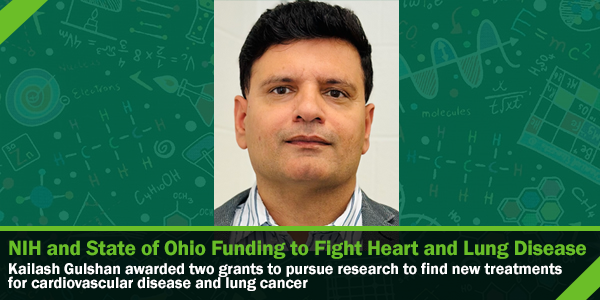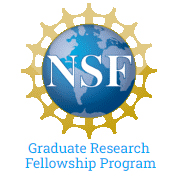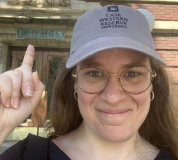
August 2024 |

Dr. Kailash Gulshan, an assistant professor in the Department of Biology, Geology, and Environmental Science (BGES) and a member of the Center for Gene Regulation in Health and Disease (GRHD), has received competitive renewal funding from the NIH for research on the role of chronic inflammation in cardiovascular disease (CVD). The four-year, $2.07 million dollar project was funded by the National Heart, Lung, and Blood Institute (NHLBI) and is titled “Phosphatidylinositol Metabolism and Trafficking in Atherosclerosis and Inflammation.” The grant will allow Dr. Gulshan and his research team to identify new targets that can serve as novel therapeutics for treatment of atherosclerosis (hardening of arteries), the major underlying cause of heart attacks.
Dr. Gulshan also received funding from Ohio Cancer Research (OCR) focused on lung cancer. The two year, $80,000 grant is titled “Targeting Inflammasome Activity in Lung Cancer.” Lung cancer accounts for 13% of all new cancer diagnoses but 24% of all cancer deaths, making it the leading cause of cancer deaths in the USA. Dr. Gulshan and his team will use a variety of lung cancer mouse models to identify new drugs that can reduce lung cancer growth and increase survival. This is the first ever OCR grant awarded to Cleveland State University. Read More »
|
Prabaha Sikder Awarded New NIH Funding to Develop Treatments for Muscle Loss Injuries Dr. Prabaha Sikder, an assistant professor in the Department of Mechanical Engineering (MCE), has been awarded $148,500 over two years by the NIH for his project titled “Bioengineering of Customized Exosomes as a Cell-free Therapy for Volumetric Muscle Loss Injuries.” Under this NIH R03 grant, Dr. Sikder and his team will take the first steps in developing an extracellular vesicle (EVs)-based regenerative therapy for major skeletal muscle injuries and defects such as volumetric muscle loss. Specifically, the research team will utilize controlled piezoelectric stimulation to engineer a unique class of therapeutic EVs that will help promote myogenesis (formation of muscle tissue) and muscle remodeling. This pilot project sets the stage for future studies that will introduce EV-based regenerative medicine therapy for treating patients with critical volumetric muscle injuries caused by traumatic incidents such as road accidents, major falls, or burn injuries. Read More » |
 |
![]()
|
NSF Graduate Research Fellowship Program (GRFP) Workshop led by Dr. Shawn Ryan Returns The Office of Research will sponsor a Workshop Series on the National Science Foundation’s Graduate Research Fellowship Program (GRFP) hosted by Dr. Shawn Ryan, an associate professor in the Department of Mathematics and Statistics and a past NSF GRFP reviewer. The GRFP program is open to science, engineering, and education majors. The program is restricted to US citizens and permanent residents. Graduate student applicants must be in the first or second year of their graduate program as of fall 2024. Undergraduate students are eligible if they intend to enroll in their graduate program by fall 2025. Students must register by September 1. Read More » |
 |
![]()
|
CSU Alum to Join CWRU Physics Faculty Congratulations to Dr. Krista Freeman (’11 BS Honors Physics, December 2011 Valedictorian, Distinguished CSU Alumna ‘16) on accepting an offer to join the Case Western Reserve University Physics Department in 2025. Dr. Freeman began her physics research under the guidance of Dr. Kiril Streletzky, including work supported by CSU’s Undergraduate Summer Research Award (USRA) program. She went on to earn a PhD at Carnegie Mellon University and work as a postdoctoral fellow at the University of Pittsburgh. Her research efforts recently led to a National Institutes of Health (NIH) MOSAIC K99 Pathway to Independence Award. Read More » |
 |
![]()

Invention Disclosure An invention disclosure was submitted by Dr. Prabaha Sikder, an assistant professor in the Department of Mechanical Engineering (MCE), titled A MULTIFUNCTIONAL PEEK CRANIAL IMPLANT. The novel cranial implant is composed of poly-ether-ether-ketone (PEEK) and a proprietary bio-ceramic compound, when combined and processed, extruded filaments are 3D printed to produce biocompatible patient specific cranial implants to allow for improved healing of brain surgeries. The novel implants can be printed to the specific scans of the patient and applied to numerous bone treatment procedures and implant components. |
Save the Date: Innovation Day Returns October 11  |
![]()

|
© 2024 - Cleveland State University - Office of Research |